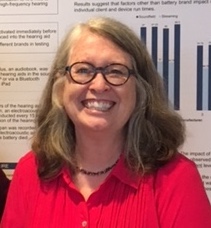 Kris English, PhD
Kris English, PhD
Professor Emeritus of Audiology
The University of Akron
In 2012, Barry and Egman-Levitan1 wrote a “perspectives” piece for the New England Journal of Medicine about the challenge of engaging patients in shared decision-making. While acknowledging the need to invite and support patients through this process, the authors also highlight a (still new at the time) requisite cultural shift among healthcare providers: “Clinicians, in turn, need to relinquish their role as the single, paternalistic authority and train to become more effective coaches or partners — learning, in other words, how to ask, ‘What matters to you?’ as well as ‘What is the matter?’” (p. 780).

NHS Scotland Guide for Patients
Their suggestion to ask the simple question, “What matters to you?” (WMTY) inspired a world-wide conversation. Just two examples: the Institute for Healthcare Improvement (IHI)2 in Boston (U.S.) now promotes the practice of asking this question as well as providing support for those who are skeptical or uncomfortable with the idea. The National Health System in Scotland3 has designed materials to support their “what matters” philosophy, as well as outreach programs to inform patients that “this is what we do/this is who we are.”
Trying Something New
If we see potential with this question but find the wording too direct, abrupt, or just awkward, we can always find ways to communicate its intent in our own style. Examples from a “What Matters to You” guideline3 are provided below.

20190304-WMTY-Guide.pdf
An Additional Consideration: Racial Equity
The President/CEO of IHI brings up another issue: that of racial heath care equity. She asks us to consider not just how we ask “what matters,” but also who we ask.4
I believe it’s safe to say that how we ask and whom we’ve asked, “What matters to you?” has often been — and too often continues to be — inequitable. Are we asking this question of our patients who may never have been asked what matters to them about their concerns and their needs? … We must consider not only what has already been expressed, but also the needs that have not yet been stated where there has been systematic underrepresentation or intentional exclusion of what matters to communities of color and other historically oppressed and marginalized populations. As we ask, “What matters to you?” in the coming 10 years, asking it more equitably will be essential for developing systems of care capable of delivering on the promise of health equity.
Along these lines, persons interested in this topic are referred to a handbook from British Columbia: Culturally Safe Engagement: What Matters to Indigenous (First Nations, Métis and Inuit) Patient Partners?5 It can serve as a model for asking “what matters” to patients in our communities who have endured healthcare disparities.
Conclusion
Consider for a moment this article title: “We Think We are Patient-Centered But the Evidence Shows All of Us Have a Few Things to Learn…”6 As we humbly absorb this truth, we are advised that one of the “few things to learn” is this: “In order to provide patient-centered care, an audiologist must individualize.” Perhaps the most straightforward way to individualize is to ask, “What matters to you?”
Clinics around the world report that this simple expression of care improves patient-clinician relationships and patient satisfaction.7-10 It is likely that many audiology centers are already asking their patients,”What matters to you?” If so, hopefully they will report on their experiences.
For more info, visit the WMTY.world website for:
- Links to websites of organizations around the world that have championed WMTY implementation
- Downloadable resources to start an implementation journey including:
- Annual WMTY implementation reports from multiple health systems
- A WMTY literature review
- A WMTY implementation toolkit
References
- Barry MJ & Edgman-Levitan S. (2012). Shared decision making – The pinnacle of patient centered care. New England Journal of Medicine, 366(9), 780-781.
- Institute for Healthcare Improvement. (2016). A simple question to put patients in the driver’s seat.
- Healthcare Improvement Scotland. (n.d.) Will you join the “What Matters to You?” conversation?
- Mate K. (2022). Why asking “What matters to you” matters.
- British Columbia Patient Safety and Quality Council. (2021). Culturally safe engagement: What matters to Indigenous (First Nations, Métis and Inuit) patient partners?
- Grenness C. (2022). We think we are patient-centered but the evidences says all of us have a few things to learn ….
- British Columbia Patient Safety and Quality Council. (2019). “What matters to you?” Evaluation report, 2018/2019.
- Montefiore Hudson Valley Collaborative. (2020). Implementation toolkit: What matters to you?
- Healthcare Improvement Scotland. (2019). “What matters to you?” – Supporting more meaningful conversations in day-to-day practice: A multiple case study evaluation.
- Pittaway H. et al (2022). Asking the question ‘What Matters to You?’ in a London intensive care unit. Journal of Patient-Centered Research and Reviews, 9(3), 166-73. doi: 17294/2330-0698.1922
